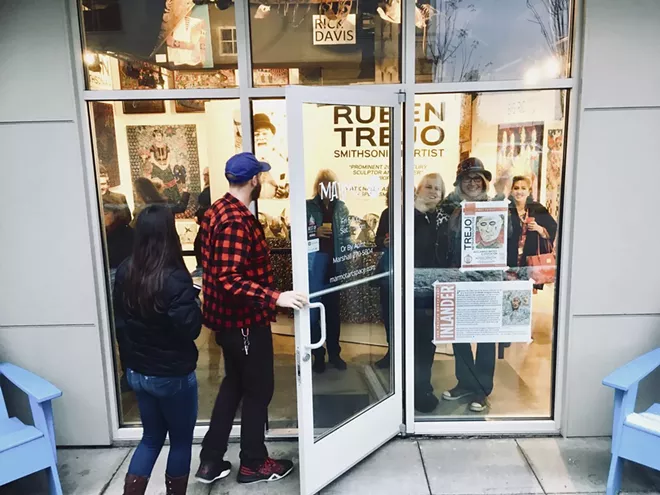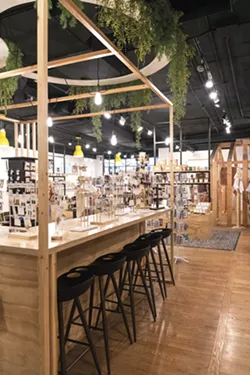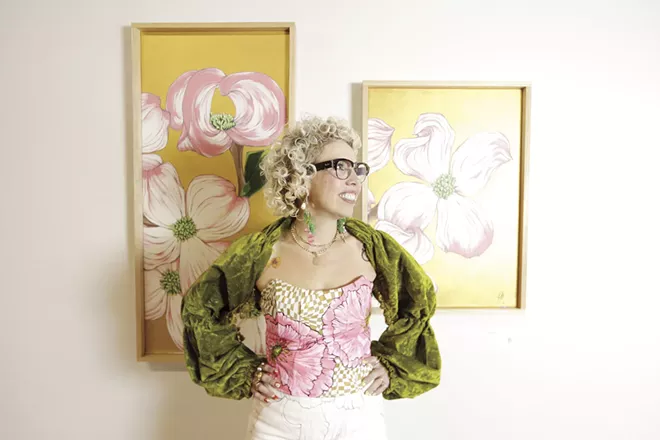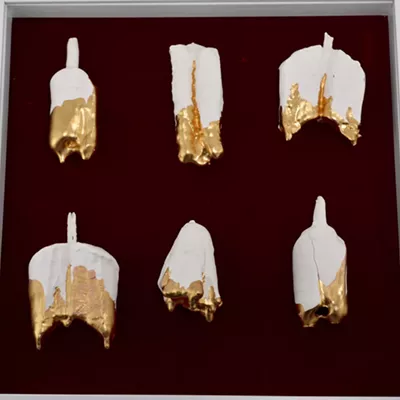By all accounts, Spokane is a perfect place to access the arts — both as a creator and as a consumer or buyer. Whether you're an art lover and you've already been looking for opportunities to bring beautiful, singular pieces of art into your space, or are wanting to fulfill a home decor need — or even if you're just curious and don't know how to start, where to start, or what to buy — Spokane's got you. Our local art sector is all about working to remove the barriers that stand in the way of your ability to enjoy art. And the first of these barriers may very well be you.
According to Spokane Arts Program Director Shantell Jackson, you've got to throw aside the idea that you're just not an "art person," and that only experts can tell you what "good" art is. "Everyone has a unique perspective," she says. "As you're looking to purchase art, ask yourself how it makes you feel. What does it make you think? How does it align to your values?"
Adds member artist T Kurtz of Spokane's Avenue West Gallery, "A lot of people worry they're going to look stupid with their taste. But they're going to come up with a cohesive collection... it all works, in the end. If you buy what you like, everything will come together in the end and be perfect."
Above all, your art is meant to be for you and you alone. So let's break down those barriers.
There's a misconception that original art is invariably expensive, with each piece costing thousands of dollars, and that acquiring it at all is simply hopeless if you're on a budget. But that's not strictly true, according to Ginger Ewing, executive director of the local arts nonprofit Terrain.
"We want artists to build relationships with art buyers, and we don't want cost to get in the way of that," she says. And Spokane provides plenty of cost-effective ways to do just that.
For instance, Terrain hosts large-scale events, like its one-night-only namesake event, which boasted 374 artists last year. Attracting thousands of attendees, Terrain the event celebrates "the full artistic spectrum," featuring not only visual art but also music, literature, film and dance. Terrain also hosts two art bazaars: Bazaar, which takes place in the summer, and BrrrZAAR, which occurs in the winter. Whimsical florals, local scenes, natural settings, playful ink sketches and countless other prints as well as a variety of crafts, plants, pottery, organic body products and more adorn booths at both markets. What's more, Ewing explains that both markets require vendors to have at least 50 percent of their objects priced at $100 or less; the events are "explicitly intended to serve as many economic statuses as possible."
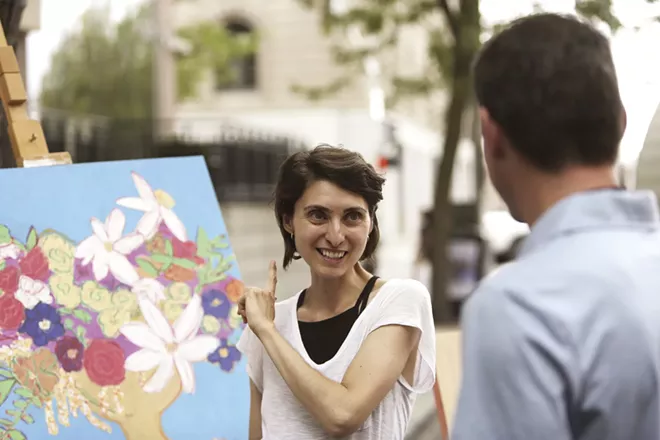

Then there's Terrain's retail program, From Here, a brick-and-mortar shop at River Park Square with wall art offerings that are as varied as you could imagine: find a colorful rendering of Manito Park by Megan Perkins, choose among Karli Fairbanks' depictions of pleased-looking sunshines, or get the latest edition in Carl Richardson's rather delightful acrylic painting series titled "love above all."
Spokane Arts offers events of its own such as Queer Art Walk, in which queer artists' work is displayed in many of downtown locations. Spokane Arts also sponsors Chase Gallery, a space located inside City Hall that celebrates local artists.
For connoisseurs and for those open to a bit of a splurge, try checking out Spokane's commercial gallery, Marmot Art Space. All of the art sold at Marmot is created by well-regarded professionals and curated by
gallery owner Marshall Peterson. Often artists pay a visit to the gallery, and Peterson is ready to guide visitors.
Artists whose work is represented at Marmot include Alfredo Arreguin, an acclaimed Mexican-American painter who recently passed away after 60 prolific years producing lush, colorful pattern works. There's also Japanese-American painter, Keiko Hara, whose renowned modern and contemporary paintings are all about "facing and examining life through her own personal language," according to ArtsWA. The Smithsonian Institution has collected the works of two more Marmot artists, Patti Warashina and Rubén Trejo. Generally, the gallery holds both figurative and representational art, including multiple media (such as acrylic and oil), and even some collage. "It's a smorgasbord," says Peterson.
So you've made the jump. You've found the art you love most, and you've bought it. Now it's time to display your treasure. But where to start? Peterson recommends William Grant Gallery and Framing, a local frame shop. But wherever you go, consider opting for conservation-grade framing, which uses acid-free materials in order to ensure the art is preserved. Keep framed pieces away from direct sunlight, maintain a consistent humidity level, and dust the frame with a soft cloth as needed.
Et voila! You're a collector.
Above all, your art is meant to be for you and you alone.



